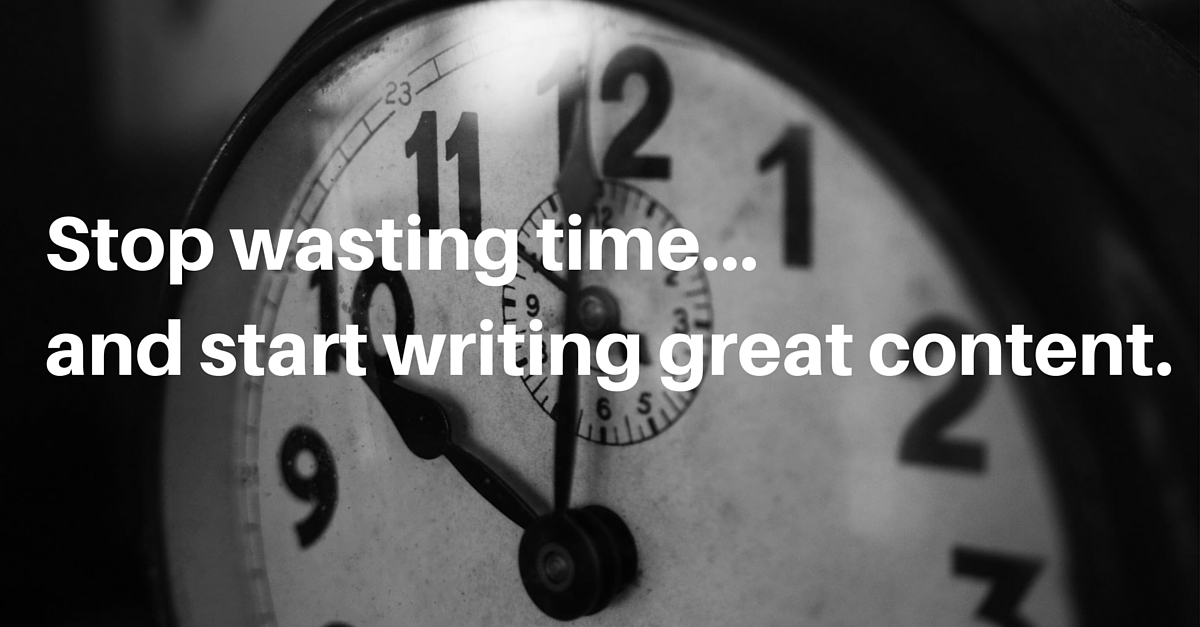I have a confession. I regularly put off writing something for my own business. I guess I’m not the only person who could own up to this. I’ll hazard a guess that right now there’s something – a blog post, a web page or a newsletter – that you’d like to get written.
We all know how important it is to have up-to-date information on our website. We know we should be sharing quality content to show our expertise and to get found by Google. And we never miss deadlines for our clients, or our accountant.
So what’s going on? Why are we procrastinating on our content?
There are so many reasons (and even more excuses). Here are just a few: It’s time consuming, there’s no ‘right’ way to do it and it’s scary as people might tell us they don’t like it. Often, in our own business, the biggest reason is because we can get away without doing it. There’s no one to hold us accountable.
Writing has been part of my work for a long time and I love it. But sometimes it’s hard to get started. Over the years, I’ve had to find ways to burst through the procrastination and write quality content that achieves its goals.
I’m going to share five simple steps that you can follow to stop wasting time and get writing right now.
1. Remember that business is all about people
People do business with people. If you can remember this, it will go a long way to helping with your writing.
- Be crystal clear who you’re writing for.
- Do you know who your ideal client is? Picture that person in your head.
- Then get clear what your one message is to them.
- What do you want them to think, feel or do when they read your blog or web page? Do you want them to be informed or educated? Or to call you or book a meeting?
2. Decide what language you’re going to use
We’re all natural storytellers but when we start to write in business something weird happens. We get caught up in trying to be professional. Either we get paralysed and can’t write anything. Or we write long, complicated sentences that don’t make sense to us, let alone anyone else. Sound familiar?
- Decide what you want your writing to sound like. Do you want to be fun, friendly, formal or conversational? Maybe your business calls for you to be a bit more serious.
- How you write should sound like you speak. It should sound like you.
- Have the courage to show your personality and passion. It’s totally possible to do this and be professional.
3. Never, ever start with a blank page
Often we simply haven’t done enough planning before we start typing Click To TweetBefore you sit down at your laptop:
- Map out the main points you want to make. I like to get old school for this and sketch out a mindmap with a paper and pen.
- Plan your structure – your main headings with a few points under each.
- If you need some inspiration, try answering the questions: Who, what, why, where, when and how.
- Straightaway your blank page has some content to get you started!
4. Choose the right environment
You’ll find it easier to create great content if you know where and when you write best Click To Tweet- Are you most productive first thing in the morning or do you find the words flow more easily late at night?
- Do you need complete silence, your favourite music or the buzz of a coffee shop?
- If you’ve got some serious writing to do, get yourself into the right space and mindset for it.
5. Just get writing
Then there’s nothing for it than to start writing. Now you’ve done all the preparation, you’ll find it much easier.
- Write freely from the heart. You can add the professional bits later.
- Write first. Edit later. If you keep going back and messing with every couple of sentences you’ll destroy your creative flow.
- Keep it simple. Get rid of the extra words. They’ll make it harder for your readers to understand your main message.
- And for goodness sake ditch the jargon! Just because you use it every day, it doesn’t mean your clients will understand it.
More than anything, remember ‘sooner rather than perfect’
By not getting your content out there, you’re depriving your audience of the expertise you have to share. And your ideal clients are not getting to learn how they could fully benefit from working with you.
I’ll leave you with three final thoughts:
- Be confident that you have what it takes to write great content for your audience.
- Know that you’re not alone in getting stuck – it happens to everyone from time to time.
- Choose one piece to tackle and get writing!
Good luck and let me know how you get on.
Image credit: Tristan Colangelo via Unsplash

